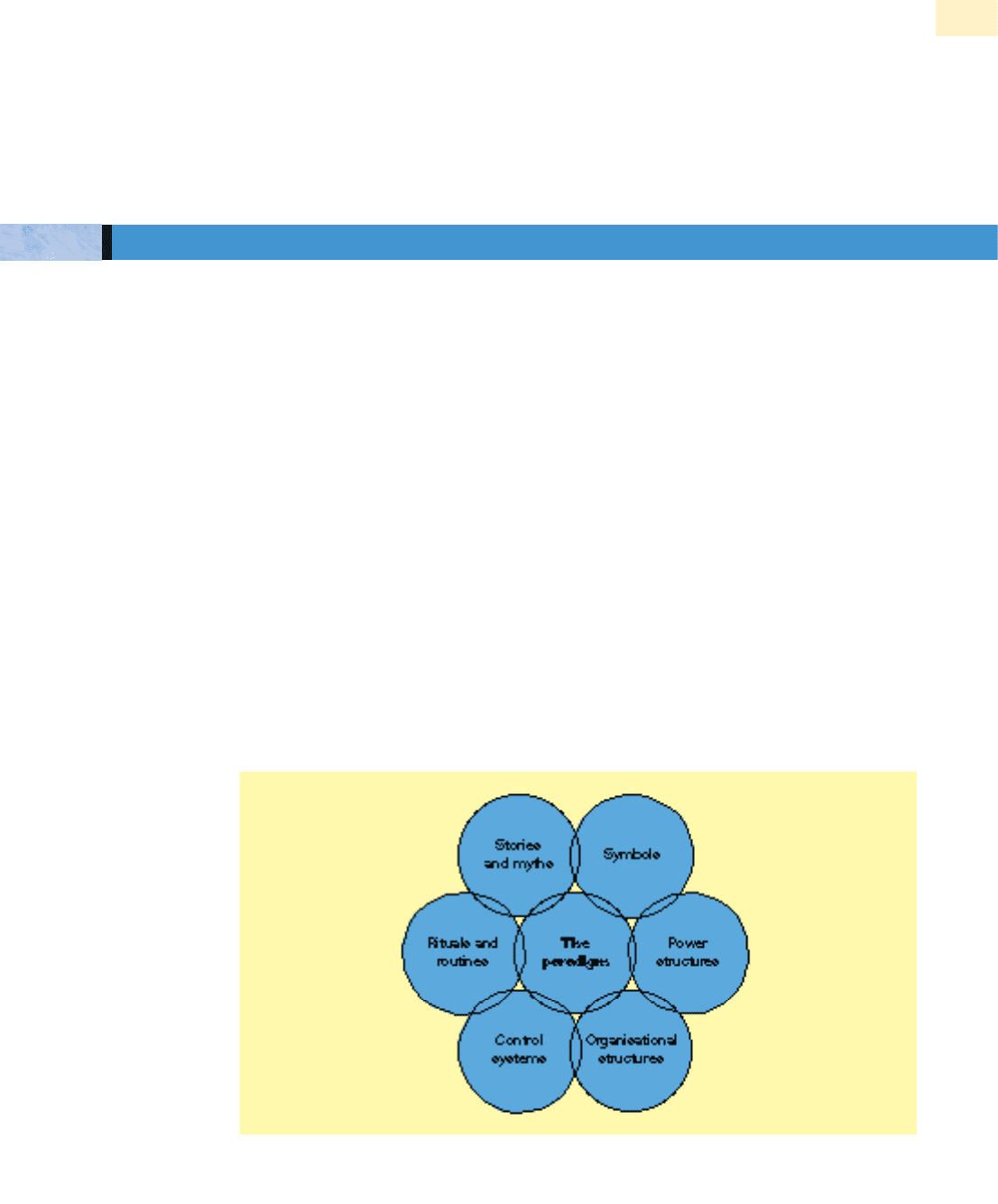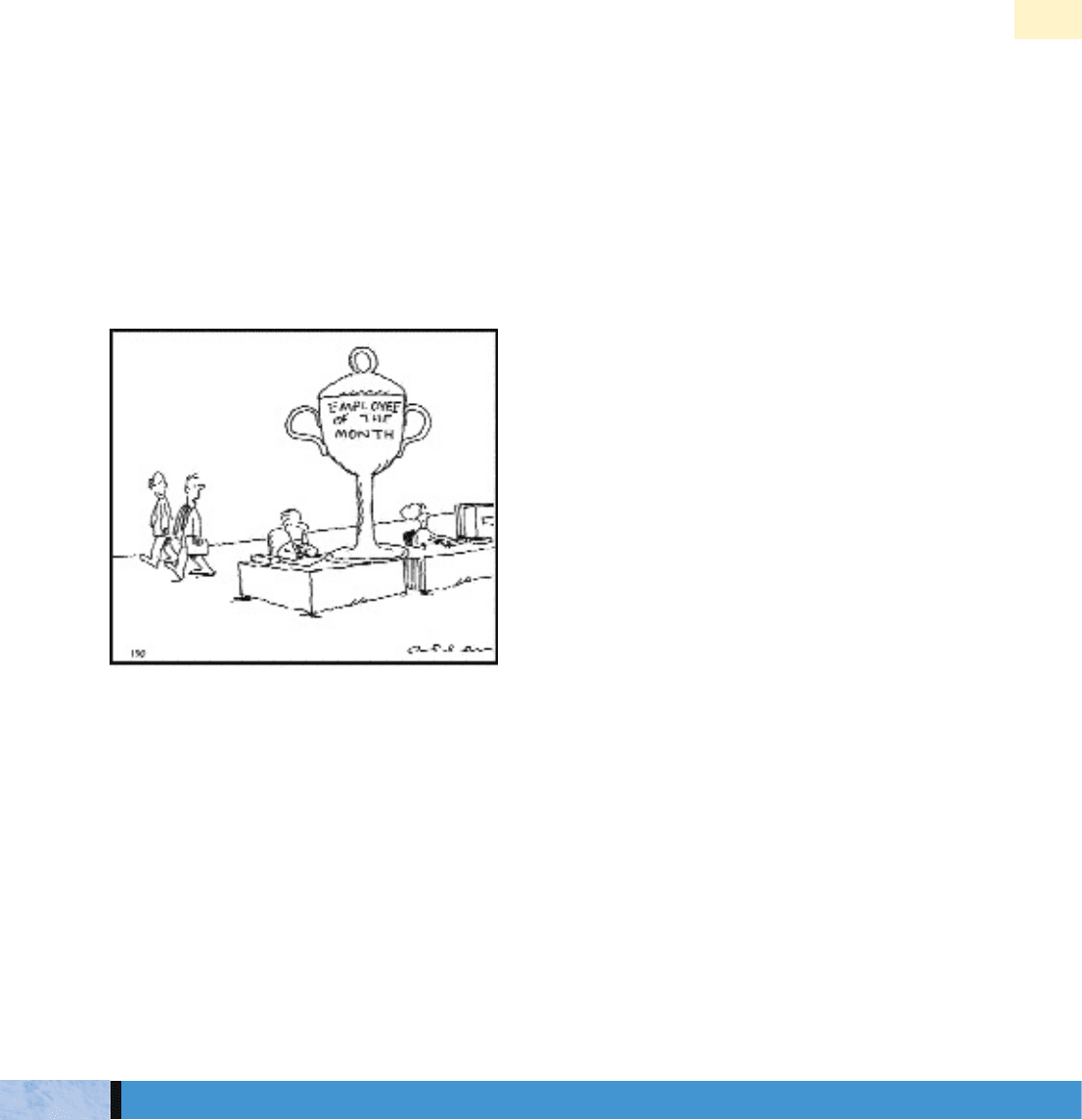Mullins L.J. Management and organisational behaviour, Seventh edition
Подождите немного. Документ загружается.


■ The environment. In order to be effective, the organisation must be responsive to
external environmental influences. For example, if the organisation operates within
a dynamic environment it requires a structure and culture that are sensitive and
readily adaptable to change. An organic structure is more likely to respond effec-
tively to new opportunities and challenges, and risks and limitations presented by
the external environment.
In order to help describe and understand the culture of an organisation, Johnson pres-
ents a cultural web, which brings together different aspects for the analysis of
organisational culture.
31
(See Figure 22.2.)
■ Routine – the ways that members of the organisation behave towards each other
and towards those outside the organisation and which make up how things are
done or how things should happen.
■ Rituals – the special events through which the organisation emphasises what is par-
ticularly important and can include formal organisational processes and informal
processes.
■ Stories – told by members of the organisation which embed the present and flag up
important events and personalities, and typically have to do with successes, failures,
heroes, villains, and mavericks.
■ Symbols – such as logos, offices, cars, titles, type of language or terminology com-
monly used which become a shorthand representation of the nature of the
organisation.
■ Power structures – the most powerful individuals or groups in the organisation
which may be based on management position and seniority but in some organisa-
tions power can be lodged with other levels or functions.
■ Control systems – the measurement and reward systems that emphasise what it is
important to monitor, and to focus attention and activity upon – for example, stew-
ardship of funds or quality of service.
CHAPTER 22 ORGANISATION DEVELOPMENT (CULTURE, CONFLICT AND CHANGE)
895
THE CULTURAL WEB
Figure 22.2 The cultural web of an organisation
(Source: Long Range Planning, vol. 25, no. 1, Johnson, G. ‘Managing Strategic Change – Culture and Actions’, p. 31, © 1992, Elsevier
Science. Reproduced with permission from Excerpta Medica Inc.)

■ Organisation structure – which reflects power structures and delineates important
relationships and activities within the organisation, and involves both formal struc-
ture and control and less formal systems.
■ Paradigm – of the organisation which encapsulates and reinforces the behaviours
observed in other elements of the cultural web.
32
Other focuses of analysis
There are, however, many other ways in which people attempt to describe and under-
stand what constitutes organisational culture, and different areas of attention for
analysing the elements of culture. For example, Wilson suggests that culture is a charac-
teristic of the organisation, not of individuals. One way to examine the culture of an
organisation is to look at its corporate image to see what and who is valued in the
organisation. The corporate image provides a mental picture that clients, customers,
employees and others have of an organisation.
33
ACAS distinguish two different organisation cultures and different ways of doing
things:
■ Control culture with the emphasis on rules and procedures, control and compli-
ance with precedent providing guidelines; and
■
Quality of working life culture with the emphasis on core values, with mission state-
ments providing guidance and commitment via shared goals, values and traditions.
34
The analysis of culture can also focus on a more specific perspective. For example,
Lynch examines the impact of culture on the development of corporate strategy.
35
Naylor suggests that quite what forms organisational culture is a difficulty and to
make a start we need to recognise both the visible and invisible layers. The visible layer
and on the surface are those elements such as artefacts, symbols, languages, stories and
activities which can be collected, compared and assembled into a description of the
organisation. Underpinning this ‘culture visible’ is the invisible layer of beliefs, values,
norms, basic assumptions and understanding.
36
Charters questions the extent to which the concept of ‘folklore’ offers the potential
to explore the existence of company myths and legends. Dictionary definitions and
discussions of the term in research papers, point to its close connection with culture.
Elements of folklore include myths and legends, and hence the concept of folklore appears to val-
idate the exploration of organisational stories as part of cultural research … If folklore really is an
expression of culture, then it could be argued that it should be possible to discern aspects of the
culture of an organisation through the legends and myths of that organisation, the stories told
which may or may not have a foundation in history.
37
At the heart of organisation development and improved performance is the need for
effective management. It is the role of management to act as an integrating activity
and to co-ordinate, guide and direct the efforts of members towards the achievement
of goals and objectives. The process of management, however, does not take place in a
vacuum but within the context of the organisational setting. Applications of organisa-
tional behaviour and the effective management of human resources are dependent
therefore not only upon the nature of the industry or business, but also upon the char-
acteristic features of the individual organisation – and its culture.
The pervasive nature of culture in terms of ‘how things are done around here’ and
common values, beliefs and attitudes will therefore have a significant effect on organ-
isational processes such as decision-making, design of structure, group behaviour, work
896
PART 8 IMPROVING ORGANISATIONAL PERFORMANCE
THE IMPORTANCE OF CULTURE

organisation, motivation and job satisfaction, and management control.
38
For ex-
ample, many managers claim that their organisation’s culture contributes considerably
to their stress.
39
Harrison and Stokes maintain that organisational culture influences the behaviour of
all individuals and groups within the organisation.
Culture impacts most aspects of organizational life, such as how decisions are made, who makes
them, how rewards are distributed, who is promoted, how people are treated, how the organiza-
tion responds to its environment, and so on.
40
A similar point is made by Reigle who refers to culture as an important factor in suc-
cessful technology implementation, innovation, mergers, acquisitions, job satisfaction,
organisational success and team effectiveness; and to the importance of determining
whether organisations exhibit organic or mechanistic cultures.
41
The pervasive nature of organisational culture means that if change is to be brought
about successfully this is likely to involve changes to culture. For example, Stewart
makes the following comment on the relationship between culture and change.
In recent years attention has shifted from the effects of the organization of work on people’s
behaviour to how behaviour is influenced by the organizational culture. What is much more
common today is the widespread recognition that organizational change is not just, or even nec-
essarily mainly, about changing the structure butoften requires changing the culture too.
42
A similar view is held by Naylor who points out that: ‘In the holistic system, any
change will affect the culture and the culture will affect or constrain the change …
Cultural change is intimately bound up with the process of organisational change.’
43
Egan refers to culture as the largest organisational control system which dictates how
crazy or idiosyncratic people can be. Companies and institutions have both an overt
and covert culture that influences both business and organisational behaviour.
The covert set can be quite dysfunctional and costly. Culture – the assumptions, beliefs, values
and norms that drive ‘the way we do things here’ – is the largest and most controlling of the sys-
tems because it affects not only overt organisational behaviour but also the shadow-side
behaviour ... Culture lays down norms for the social system. In one institution you had to be an
engineer to rise to the top. There was no published rule, of course, it was just the way things
were. In one bank you could never be made an officer of the company if you wore polyester
clothes. Culture tells us what kind of politics are allowed and just how members of an organisa-
tion are allowed to play the political game.
44
Egan also distinguishes between the ‘preferred culture’ which serves the business and
the ‘culture-in-use’. This culture-behind-the-culture carries the real beliefs, values and
norms that drive patterns of behaviour within the company. These remain unnamed,
undiscussed and unmentionable and these covert cultures lie outside ordinary mana-
gerial control. The first step in changing such limiting behaviour features is to identify
the preferred culture and to ensure that the company’s way of operating effectively
serves the business right now.
45
The importance of culture raises interesting questions relating to its nature and influ-
ence in ‘short-life’ organisations – that is, organisations created to run for only a short
period of time such as arts festivals or national garden festivals.
46
For example, how does
culture develop when the organisation has little or no prior history, has short-term goals
and objectives, and has only limited time for top management to exercise influence?
How do managers in such organisations attempt to inculcate culture? From a study
of the Garden Festival Wales, Meudell and Gadd found that success in creating a culture
occurred as a direct result of their recruitment and training initiatives. However, it is
not only culture but climate that is important for organisational effectiveness.
CHAPTER 22 ORGANISATION DEVELOPMENT (CULTURE, CONFLICT AND CHANGE)
897
Overt and
covert culture
Culture in
short-life
organisations

Rigorous training in customer care/corporate culture might produce an automatic ‘Have a nice
day’ but only the engendering of a suitable climate will encourage people to say it and mean it.
47
Culture and organisational performance
Culture can help reduce complexity and uncertainly. It provides a consistency in outlook
and values, and makes possible the processes of decision-making, co-ordination and con-
trol.
48
Culture is clearly an important ingredient of effective organisational performance.
In their study of 62 American companies with outstandingly successful performance,
Peters and Waterman draw attention to the importance of corporate culture.
Without exception, the dominance and coherence of culture proved to be an essential quality of
the excellent companies. Moreover, the stronger the culture and the more it was directed to the
marketplace, the less need was there for policy manuals, organization charts, or detailed proce-
dures and rules. In these companies, people way down the line know what they are supposed to
do in most situations because the handful of guiding values is crystal clear.
49
Although a number of the original ‘excellent’ organisations have since fallen from
grace, the importance of culture to effective organisational performance still stands
and has been reinforced by a study by Heller of Europe’s top companies. For example,
in commenting on Heineken’s superiority in world markets, Heller makes the point
that it rests in part on its remarkable corporate culture:
There is nothing accidental about cultural strengths ... There is a relationship between an organi-
zation’s culture and its performance.
50
In their original study of highly successful companies, Goldsmith and Clutterbuck identi-
fied eight characteristics built into the day-to-day culture of the organisation. From
their subsequent study of the world’s top companies a key characteristic of high-
performing companies is a challenge culture. All the companies are very demanding of
the people who work for them but this is balanced by a nurturing culture which shows
that they also care for their employees in numerous ways.
51
Brown suggests that organisational culture can be a powerful tool for improving per-
formance and the key to effective leadership and organisational development.
However, it is important that:
Effective leadership and workable organization design and development programmes must be
based on sensitivity to, and understanding of, culture. Excellent leaders are not merely aware of
the organization’s basic assumptions, they also knowhow to take action and mould and refine
them. This process of cultural management appears to have been achieved through the skilful
use of artifacts, stories, myths and symbolic actions to reinforce desired patterns of thought and
behaviour.
52
Chatman and Cha suggest that every company has a culture – good or bad. However,
there is more to a good culture than happy staff. In order to aid long-term perform-
ance, there are three main criteria needed to develop a suitable culture:
■ it must be strategically relevant;
■ it needs to be strong in order that people care about what is important; and
■ the culture must have an intrinsic ability to adapt to changing circumstances.
In order that leaders can develop, manage and change their culture for better perform-
ance, Chatman and Cha refer to the use of three managerial tools.
■ Recruitment and selection – hire people who fit the company’s culture even if this
may involve overlooking some technical skills for a better cultural fit. Look carefully
at the characteristics of your recruiters and consider your selection decision in the
light of culture.
898
PART 8 IMPROVING ORGANISATIONAL PERFORMANCE
Use of
managerial
tools

■ Social tools and training – develop practices that enable new people to understand
the values, abilities, expected behaviour and social knowledge in order to participate
fully as an employee, and to create strong bonds among members.
■ Reward system – culture is an organisation’s informal reward system but it needs to
be intricately connected to formal rewards. Examples include staff meetings where
the seating arrangement is in accordance with level of sales, name badges that
include inventory losses, and payments of large commissions in front of customers
and other staff.
53
Culture helps to account for variations among organisations and managers, both
nationally and internationally. It helps to explain why different groups of people per-
ceive things in their own way and perform things differently from other groups.
54
With
greater international competition, an understanding of national culture has become of
increasing importance for managers. According to Siddall, for example: ‘international
business, the issue of culture and the need for better understanding have become major
parts of organisational behaviour’.
55
Cultural practices vary widely among different
countries and because of our own values may be difficult to understand.
Schneider and Barsoux suggest that cultural beliefs and values influence the meaning
of management and also show up differences in conceptions of organisations. National
differences and cultural reasons raise concerns about the transferability of organisa-
tional structures, systems and processes and question the logic of universal ‘best
practice’.
56
Cheng et al. also question the universality of theories of management and
organisational behaviour on the ground that they have not adequately addressed the
factor of culture.
57
Those fortunate enough to have shared the experience of the author
in visiting both Disneyland in Florida and Disneyland Paris would probably have wit-
nessed the cultural differences in the attitudes to, and acceptance of, the Disney
approach and procedures between American and French employees.
In addition to arrangements for the carrying out of organisational processes, manage-
ment has a responsibility for creating a climate in which people are motivated to work
willingly and effectively. Organisational climate is a general concept and difficult to
define precisely. It is more something which is felt. It can be likened to our description
of the weather and the way in which the climate of a geographical region results from
the combination of environmental forces. Some of these forces are better understood
than others.
Applied to organisations, climate can be said to relate to the prevailing atmos-
phere surrounding the organisation, to the level of morale, and to the strength of
feelings or belonging, care and goodwill among members. Climate will influence
the attitudes which members of the organisation bring to bear on their work perform-
ance and personal relationships. The extent to which employees accept the culture of
the organisation will have a significant effect on climate.
From a detailed study of approaches to organisational climate, Moran and Volkwein
conclude that:
... since climate operates at a more accessible level than culture, it is more malleable and, hence,
the more appropriate level at which to target short-term interventions aimed at producing posi-
tive organizational change … [however] interventions to change climate must consider the
deeper patterns embedded in an organization’s climate.
58
CHAPTER 22 ORGANISATION DEVELOPMENT (CULTURE, CONFLICT AND CHANGE)
899
National and
international
culture
ORGANISATIONAL CLIMATE

Whereas organisational culture describes what the organisation is about, organisational
climate is an indication of the employees’ feelings and beliefs of what the organisation
is about. Climate is based on the perceptions of members towards the organisation.
Organizational climate is a relatively enduring quality of the internal environment of an organiza-
tion that (a) is experienced by its members, (b) influences their behavior, and (c) can be described
in terms of the values of a particular set of characteristics (or attributes) of the organization.
59
Climate also relates to the recognition of the organisation as a social system and the
extent to which membership is perceived as a psychologically rewarding experience. It
can be seen as the state of mutual trust and understanding among members of the
organisation. For example, Rentsch suggests that: ‘one assumption of climate theory is
that organizational members perceive and make sense of organizational policies, prac-
tices, and procedures in psychologically meaningful terms’.
60
Characteristics of a healthy organisational climate
Organisational climate is characterised, therefore, by the nature of the people–organi-
sation relationship and the superior–subordinate relationship. These relationships are
determined by interactions among goals and objectives, formal structure, the process
of management, styles of leadership and the behaviour of people.
Although similar types of organisations will share certain common features and
norms, each organisation will have its own different and distinctive features. In general
terms, however, a healthy organisational climate might be expected to exhibit such
characteristic features as:
■ the integration of organisational goals and personal goals;
■ the most appropriate organisation structure based on the demands of the socio-
technical system;
■ democratic functioning of the organisation with full opportunities for participation;
■
justice in treatment with equitable HRM and employment relations policies and practices;
■ mutual trust, consideration and support among different levels of the organisation;
■ the open discussion of conflict with an attempt to avoid confrontation;
■ managerial behaviour and styles of leadership appropriate to the particular work
situations;
■
acceptance of the psychological contract between the individual and the organisation;
■ recognition of people’s needs and expectations at work, and individual differences
and attributes;
■ equitable systems of rewards based on positive recognition;
■ concern for the quality of working life and job design;
■ opportunities for personal development and career progression;
■ a sense of identity with, and loyalty to, the organisation and a feeling of being a
valued and important member.
If organisational climate is to be improved, then attention should be given to the above
features. A healthy climate will not by itself guarantee improved organisational effective-
ness. However, an organisation is most unlikely to attain optimum operational
performance unless the climate evokes a spirit of support and co-operation throughout the
organisation, and is conducive to motivating members to work willingly and effectively.
In the Goldsmith and Clutterbuck study of the world’s top companies, referred to
above, a theme echoed throughout the interviews was that the need to drive people to
extraordinary achievement was balanced by the need to make them feel valued and
supported. They don’t see a conflict between being hard and soft on their people, and
one of the characteristics observed was the sure zest they had for the tasks over which
they had control. Although typically paid above average, people in these companies
come to work less for the money than because they enjoy it.
61
The illustrative com-
900
PART 8 IMPROVING ORGANISATIONAL PERFORMANCE

ments from people at all levels in these companies are supportive of what could be
described as a healthy and supportive organisational climate.
Whitmore suggests that two human drives rise above all others; the need for self-
belief, and the need for a sense of meaning and purpose in our lives. They exist
independent of race, creed and culture. These two needs are the fundamental bedrocks
that underlie business performance, and the importance of generating a climate of cre-
ativity within an organisation stems from recognition of their significance.
62
Organisational climate will influence the level of morale and attitudes which members
of the organisation bring to bear on their work performance and personal relation-
ships. Morale, however, is another general concept which is difficult to measure
objectively. A carefully designed and conducted attitude
survey may help to establish the feelings of staff on fac-
tors contributing to organisational climate. When
morale is low, and feelings of frustration or alienation
are found to exist, it is important that positive action is
taken to remedy the causes.
Morale can be viewed in terms of the mental attitudes
which people have towards their tasks and responsibili-
ties. Petrick and Manning suggest that before managers
can start to improve morale they should review four
main areas in which to develop the best possible atti-
tudes in their staff.
■ A sense of importance in their job. Staff should
have a feeling of meaning in the job, challenging
and reasonably demanding assignments, and a
sense of job accomplishment based on competent
performance.
■ Teamwork among the staff. There should be a sense of group pride and self-esteem,
a high level of human interactions and good relations with co-workers, team effort
and the support of other staff including supervisors and top management.
■ Management care about staff welfare. Staff should receive just rewards for their
contribution and fair treatment for their efforts. There should be a clear statement of
management goals and efforts to resolve genuine goal incongruence. Management
should show concern for staff welfare, and attempt to create a feeling of mutual
trust and respect with staff.
■ Economic rewards fair and individualised. Attention should be given to payment
of sufficient wages and the fair distribution of wages. If fringe benefits are
added management should attempt to meet individual needs and preferences.
There should be opportunities for job advancement including promotion and cross-
job postings.
63
Among the factors which contribute to a healthy organisational climate, high morale
and motivation, is the extent to which members of staff have a sense of commitment
to the organisation. The extent of their commitment will have a major influence on
the level of work performance. Walton suggests that a significant change in approaches
to the organisation and management of work is from organisational control to com-
mitment in the workplace. The evidence is well grounded that underlying all the
policies of commitment strategy is a management philosophy at the centre of which ‘is
a belief that eliciting employee commitment will lead to enhanced performance’.
64
CHAPTER 22 ORGANISATION DEVELOPMENT (CULTURE, CONFLICT AND CHANGE)
901
Staff morale
‘I see you’re big on building up staff morale’
Source: © Dave Allen/www.CartoonStock.com
EMPLOYEE COMMITMENT

The concept of commitment itself, and the manner in which it is actually created, is
not easy to describe. There does, however, appear to be a growing acceptance of the
notion of attachment and loyalty. O’Reilly refers to the term ‘organizational commit-
ment’ as ‘typically conceived of as an individual’s psychological bond to the
organization, including a sense of job involvement, loyalty, and a belief in the
values of the organization’.
65
Martin and Nicholls view commitment as encapsulating ‘giving all of yourself while
at work’. This entails such things as using time constructively, attention to detail,
making that extra effort, accepting change, co-operation with others, self-develop-
ment, respecting trust, pride in abilities, seeking improvements and giving loyal
support.
66
Based on case studies of 14 British companies, including Jaguar, Royal Bank
of Scotland, British Steel, Pilkingtons, Rothmans, Raleigh, Schweppes and Burton,
Martin and Nicholls present a ‘model of commitment’ based on three major pillars,
each with three factors.
(i) A sense of belonging to the organisation.
This builds upon the loyalty essential to successful industrial relations. The sense
of belonging is created by managers through ensuring that the workforce is:
■ informed
■ involved
■ sharing in success.
(ii) A sense of excitement in the job
Improved results will not be achieved unless workers can also feel a sense of excite-
ment about their work which results in the motivation to perform well. This sense
of excitement can be achieved by appealing to the higher-level needs of:
■ pride
■ trust
■ accountability for results.
(iii) Confidence in management
The senses of belonging and excitement can be frustrated if workers do not have
respect for, and confidence in, management leadership. This respect is enhanced
through attention to:
■ authority
■ dedication
■ competence.
A large measure of the success of the companies studied derives from their manage-
ment of people and from creating a climate for commitment. For example: ‘If people
feel trusted, they will make extraordinary efforts to show the trust to be warranted.’
However, creating commitment is hard. It takes time, the path is not always smooth
and it requires dedicated managers.
Securing the commitment of staff
Genuine commitment requires not just a recognition or understanding of what the
organisation expects but an emotional and behavioural response from staff. If loyalty,
long service or expertise appear to be no longer rewarded, this may well have an
adverse effect on those members of the organisation who do survive and they are less
likely to have a high level of commitment to the organisation.
67
Guirdham suggests
that ‘commitment of staff to the organisation has long been valued and is coming back
into fashion as the costs to loyalty of downsizing and re-engineering come to be felt’.
68
And according to Gratton, ‘understanding the soul of the organisation and building
trust and commitment is crucial to ongoing adaptation and change’.
69
902
PART 8 IMPROVING ORGANISATIONAL PERFORMANCE

In Chapter 2 we referred to the changing nature of the psychological contract. Hiltrop
suggests that the increasing pressure for organisations to change has prompted growing
disillusionment with the traditional psychological contract based on lifetime employ-
ment and steady promotion from within. Companies must develop new ways to increase
the loyalty and commitment of employees. This includes attention to reward strategies
based on recognition of contribution rather than status or position, systematic training
and development including the skills for working in cross-functional teams; and the
training of managers in counselling, coaching and leadership skills.
70
After the downsizing, de-layering, streamlining and outsourcing of recent years,
Altman et al. question whether companies can continue to count on commitment from
employees when they are no longer seen to be committed to them. The more compa-
nies downsize, the more they are seen to be breaking the psychological contract. A new
psychological contract needs to consider the organisation of the future.
The old ‘command and control’ interpretation of loyalty in the workplace needs to be replaced with
an attitude of commitment by both sides which leads to a more pragmatic relationship within the
limited horizons against which businesses are being managed today worldwide. Employers will still
commit themselves to their employees but employment can no longer be guaranteed.
71
Galunic and Weeks suggest that with the demise of job security, companies need other
strategies to encourage commitment. Examples include paying more attention to com-
pensation, flexible working, spending to support telecommuting and lifestyle friendly
perks. However while such initiatives may encourage employees to work hard, they are no
substitute for job security. In order to help restore commitment without again offering job
security, Galunic and Weeks propose that in addition to company-specific training, there
is a programme of investment in generic training that focuses on general skills and educa-
tion to raise the professional level of employees. By developing ‘employability’ and the
ability to earn a living through professional or occupational – not job – security, employ-
ees are in turn likely to respond with greater commitment to the company.
72
Watson refers to the basic choice that managers can make in trying to achieve manage-
rial control through work design. The choice between direct and indirect control
attempts influences the extent of the psychological commitment that is sought from
staff. An organisation leaning towards direct control principles would be highly cen-
tralised with a tight bureaucratic structure and culture. There is an emphasis on strict
rules and closely prescribed procedures in which a relatively low level of psychologi-
cal commitment would be sought from employees.
Because of the implication that management are putting little trust in employees to
use their own discretion a ‘low-trust’ culture emerges. By contrast, an organisation
leaning more towards the use of indirect control would be less centralised with a
looser bureaucratic structure and culture. Rules would be relatively loose and proce-
dures more flexible as employees have more discretion about how to carry out their
tasks in a manner fitted to managerial requirements and strategic priorities. Because of
a high level of trust between members of the organisation there is a high level of psy-
chological commitment to the organisation.
73
It might be expected that a healthy organisational climate would be reflected by com-
plete harmony in working relationships, and loyalty and common commitment to the
goals and objectives of the organisation. This view of work organisations as ‘happy
families’ is perhaps a worthwhile and creditable ideal and as such appears to be implied
by a number of management writers.
CHAPTER 22 ORGANISATION DEVELOPMENT (CULTURE, CONFLICT AND CHANGE)
903
Level of
psychological
commitment
ORGANISATIONAL CONFLICT

For example, Drucker makes the following point:
Any business enterprise must build a true team and weld individual efforts into a common effort.
Each member of the enterprise contributes something different, but they must all contribute
towards a common goal. Their efforts must all pull in the same direction, and their contributions
must fit together to produce a whole – without gaps, without friction, without unnecessary duplica-
tion of effort … The manager must know and understand what the business goals demand of him in
terms of performance, and his superior must know what contribution to demand and expect of him
– and must judge him accordingly. If these requirements are not met, managers are misdirected.
Their efforts are wasted. Instead of teamwork, there is friction, frustration and conflict.
74
Such traditional views appear to imply a unitary perspective of the organisation, as
discussed in Chapter 19. The organisation is viewed as an integrated and harmonious
whole. Conflict is seen as a dysfunction outcome and can be explained, for example,
by poor communications, personality clashes or the work of agitators. But, if one
accepts the views of, for example, the social action writers and the idea of a pluralistic
approach to work organisations, then conflict among competing sub-groups will be
seen as inevitable. Conflict is seen as an inherent feature of organisations and induced,
in part, by the very structure of the organisation. The pluralistic manager is more likely
to accept that conflict in organisations requires careful handling and attempt to recon-
cile rival interests.
The radical perspective is associated with the ideas of writers such as Karl Marx and the
structuralist approach to organisations and management discussed in Chapter 3.
75
It
challenges the traditional view of conflict and sees organisations in terms of the dispar-
ity in power and control. Conflict is a feature of the unequal nature of organisational
life and a means of bringing about change.
76
Collective bargaining is not seen as par-
ticularly helpful in a system stacked against the workers. Conflict is a natural part of
the class struggle. The design of organisation structure, management systems and the
choice of technology all form part of the struggle for power and control within the
work organisation.
According to the radical approach, the design of organisation structure, manage-
ment systems and the choice and use of technology all form part of the struggle for
power and control within the work organisation. Greater attention should be given to
relationships between the formal and informal aspects of the organisation and the
study of conflict between the needs of the individual and those of the organisation,
and between workers and management.
Conflict, then, can be regarded as a reality of management and organisational behaviour
and can be related to power and politics. Most of us will understand what is commonly
meant by organisational conflict and be aware of its existence and effects. Yet conflict
is another term which can be defined and interpreted in a number of ways. For our
purpose we can see conflict as behaviour intended to obstruct the achievement of
some other person’s goals. Conflict is based on the incompatibility of goals and arises
from opposing behaviours. It can be viewed at the individual, group or organisation
level. Ackroyd and Thompson use the term ‘organizational misbehaviour’ to refer to
‘anything you do at work which you are not supposed to’. Management establish
boundaries that distinguish acceptable and non-acceptable behaviour from employees.
The actions of employees are then judged as falling one side or the other of these
boundaries.
77
904
PART 8 IMPROVING ORGANISATIONAL PERFORMANCE
The radical
perspective
CONTRASTING VIEWS OF CONFLICT
